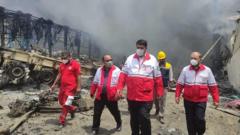The blast has claimed multiple lives and injuries, igniting a wave of criticism towards authorities over the circumstances surrounding the incident.
**Devastation and Accountability: Iran's Largest Port Explosion Leaves Community in Shock**

**Devastation and Accountability: Iran's Largest Port Explosion Leaves Community in Shock**
In the wake of a catastrophic explosion at Iran's Shahid Rajaee port, the community is transitioning from mourning to outrage, demanding accountability from the government.
The explosion at Iran’s Shahid Rajaee port on Saturday has sparked a wave of grief and anger across the nation, resulting in at least 40 fatalities and over 1,000 injuries. Residents reported the dire conditions at hospitals as they rushed to donate blood in solidarity with the victims. The fallout from the explosion saw a plume of thick black smoke lingering over the area, causing health concerns for nearby residents. Health officials urged citizens in the region, including Bandar Abbas—home to a major naval base—to remain indoors and adopt protective measures.
As fires continued to rage at the site, a local festival transformed into a poignant memorial, coinciding with a government-initiated day of national mourning. In addition, two days of mourning were declared in Hormozgan province, demonstrating the profound impact of the disaster across the nation.
Amidst the mourning, the debate over responsibility and future safety has intensified. Ambrey Intelligence reported that the cause of the explosion stemmed from the improper handling of solid rocket fuel, raising uncomfortable questions about safety protocols at the port. Speculation on social media fueled further concern, leading many to question the Iranian military's claims regarding the storage of hazardous materials. The government has yet to satisfactorily address allegations regarding negligence and incompetence linked to the calamity which, according to some, could have been avoided.
Iranian President Masoud Pezeshkian inspected the disaster site and announced an investigation into the incident. Defense officials insisted that no military-grade materials were present, attributing the explosion to conditions at a chemical storage depot.
The port is critical for Iran’s economy, managing nearly 80% of the country’s imports. Initial concerns of impending food shortages were quelled by authorities who suggested that only parts of the port would face operational disruptions. Meanwhile, international support has poured in, with expressions of sympathy from countries like the UAE, Russia, and others.
Despite the tragic implications of the explosion, diplomatic talks between Iranian and US officials are reportedly proceeding, with both sides indicating progress in negotiations related to Iran's contentious nuclear program. However, amid this backdrop of burgeoning dialogue, the pain of loss and growing calls for transparency in the wake of the disaster remain at the forefront of public consciousness.
As fires continued to rage at the site, a local festival transformed into a poignant memorial, coinciding with a government-initiated day of national mourning. In addition, two days of mourning were declared in Hormozgan province, demonstrating the profound impact of the disaster across the nation.
Amidst the mourning, the debate over responsibility and future safety has intensified. Ambrey Intelligence reported that the cause of the explosion stemmed from the improper handling of solid rocket fuel, raising uncomfortable questions about safety protocols at the port. Speculation on social media fueled further concern, leading many to question the Iranian military's claims regarding the storage of hazardous materials. The government has yet to satisfactorily address allegations regarding negligence and incompetence linked to the calamity which, according to some, could have been avoided.
Iranian President Masoud Pezeshkian inspected the disaster site and announced an investigation into the incident. Defense officials insisted that no military-grade materials were present, attributing the explosion to conditions at a chemical storage depot.
The port is critical for Iran’s economy, managing nearly 80% of the country’s imports. Initial concerns of impending food shortages were quelled by authorities who suggested that only parts of the port would face operational disruptions. Meanwhile, international support has poured in, with expressions of sympathy from countries like the UAE, Russia, and others.
Despite the tragic implications of the explosion, diplomatic talks between Iranian and US officials are reportedly proceeding, with both sides indicating progress in negotiations related to Iran's contentious nuclear program. However, amid this backdrop of burgeoning dialogue, the pain of loss and growing calls for transparency in the wake of the disaster remain at the forefront of public consciousness.





















